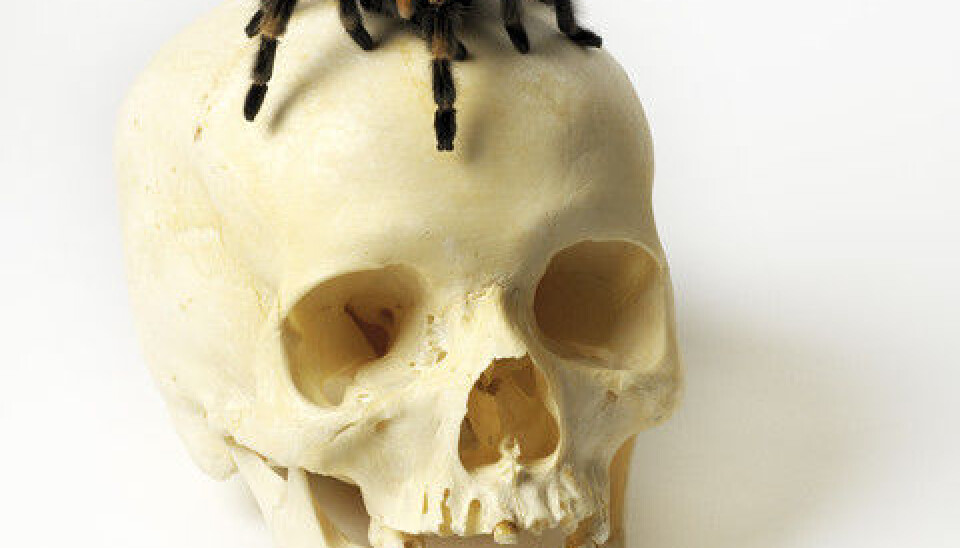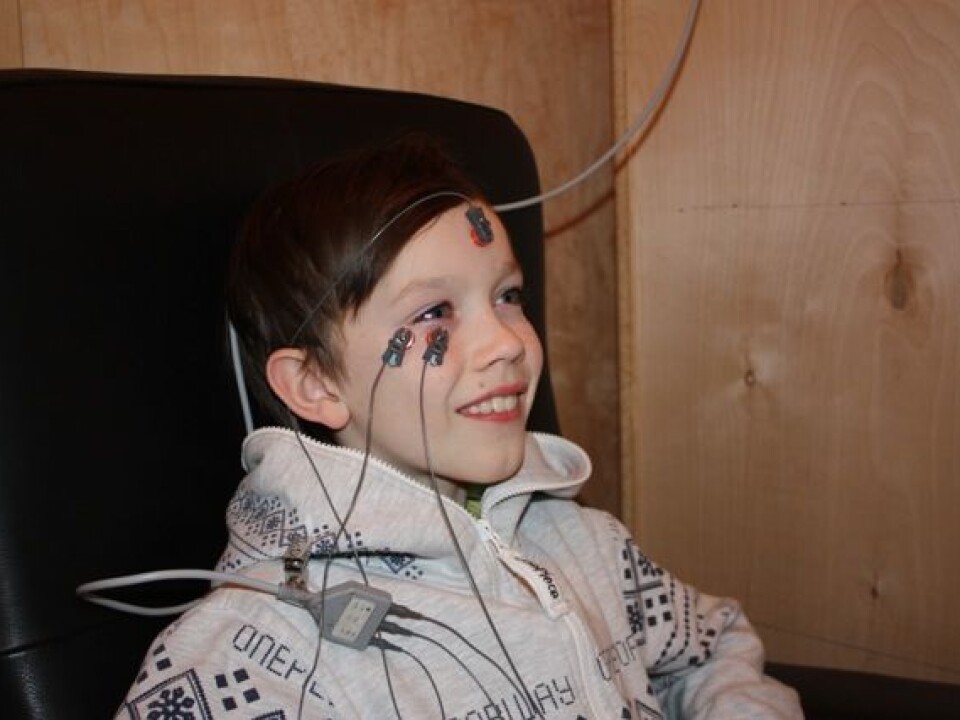An article from University of Tromsø – The Arctic University of Norway

Your fear reaction is lightning quick
If you are exposed to something you’re afraid of, such as a spider, you feel fearful in just a tenth of a second!
Denne artikkelen er over ti år gammel og kan inneholde utdatert informasjon.
“I am studying how quickly you react to something that is frightening, and it turns out that it takes just a tenth of a second between the time you are exposed to something that you fear until you react," says Ole Åsli, a postdoc in the Department of Psychology at the University of Tromsø.
"Our reaction to fear is almost as quick as a reflex.”
Åsli says that as humans, we are predisposed to being afraid, and that this reaction comes from our ancestors. When our ancestors lived in Africa, it was individuals who learned to fear danger who survived.
“Being afraid of snakes and spiders used to be a helpful reaction, but it is not as useful today. We probably have an overly effective fear system."
The brain’s fear centre

Department head Magne Arve Flaten says that fear comes from the part of our brain that is specialized to express terror.
“Our fear centre sits in an area in the front of the brain near the temple and is called the amygdala. Studies that have been done on people who lack an amygdala demonstrate that they do not exhibit fear,” he says.
Flaten and Åsli say that people without an amygdala realize that things are dangerous, but they do not feel fear. These people fail to recognize fear in others.
“They can see that people are happy, angry or upset, but they cannot recognize fear and fright. It can be dangerous not to be afraid. Individuals who have Urbach-Wiethes syndrome, which can affect the amygdala, rarely live into their old age,” Flaten says.
Fear is important because it awakens our survival instinct. Fear readies us to flee or attack.
“When we are afraid, our bodies undergo a series of physiological changes. We have all heard stories of mothers who have lifted a car to save their child, and people who are afraid do not feel physical pain when they are injured. People may be fatally stabbed, but may still be able to run away from the perpetrator. The pain comes afterwards," says Åsli.
"The reason for this is that the blood goes from the brain to the muscles. We are governed by our reflexes and become strong," he explains.
"The body is ready for fight or flight.”
Unnecessary fear
To be frightened in this context can be a positive thing, but what if you are afraid of something that is actually safe? Overreacting with fear every time you see a wasp can be exhausting.
“People can be afraid of many things. Many Europeans are terrified of insects, but strictly speaking, electrical sockets are far more dangerous for us, not to mention driving. Automobile phobias are extremely rare, but there are reports of chocolate phobia," says Flaten.
"Fear is often driven by unconscious processes.”
Fighting fright
People who are fearful can be quite limited in their everyday lives. A fear of confined spaces, open spaces or big crowds may mean that people isolate themselves and their quality of life can be quite poor.
“The best treatment for fear is to be exposed to what you fear. You then find out that what you were afraid was going to happen does not happen. But you need to start slowly with exposing yourself to frightening things. If you are afraid of spiders, you should gradually get closer to them," explains the researhcer, smiling.
"First, think through how you should approach the spider, and then start your approach. The goal is to let the spider crawl under your shirt. I've seen people who have actually done this.”
According to his colleagues at the Department of Psychology, we learn to be afraid very quickly. For example, if you have fallen off a horse, your fear of horses may last for a very long time.
“Our ability to be afraid is very effective – it only takes one incident for us to be fearful of something. However, it may take a long time for us to unlearn the fear,” says Åsli.
A rapid startle reflex
Humans are also very jumpy. It does not take much to make us really jump out of our skins.
“We humans have a well-developed startle reflex, and research has shown that the more afraid we are, the more powerful the reflex.”
Researchers can measure our startle reflex, and how scared we are by measuring how much we blink.
Flaten and Åsli have studied this by placing electrodes under the eyes of test subjects to record their startle reflex. In order to measure fear, for example, the researchers combine a tone with an electric shock.
The subject thus becomes afraid of the tone because they know that it is associated with a shock, so when a loud tone triggers the subject’s startle reflex, the researchers can measure the degree of fear.
“The fear of the tone makes it so that you are extra jumpy, and you blink even more than you otherwise might.”
Flaten says that action movies deliberately put us in a state where we are more likely to startle. The music and mood affect us so that we jump in our seats.
“We humans are so sensitive to fear that when we even see a picture of something that looks like what we are afraid of, we respond immediately. The pictures were shown for only a few hundredths of a second so that the test subjects could not see the contents of the images," says Flaten.
"The subjects reported that they did not see what was in the picture that was shown, but you could see that the person responded physiologically with fear.”



































